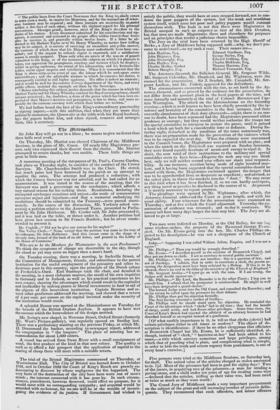The trial of the Bristol Magistrates commenced on Thursday, at
Westminster Hall. The City of Bristol was burned down in October 1831, and in October 1832 the Court of King's Bench are gravely en- deavouring to discover by whose negligence the fire happened. The very facts of the destruction of the city have been worn out of men's minds ; the interest connected with it has gone by. In such circum- stances, punishment, however deserved, could effect no purpose, for it would meet with no corresponding sympathy; and acquittal would be attended with no honour, for no one will be at the trouble of investi- gating the evidence of its justice. If Government had wished to • satisfy the public, they would have at once stepped.forward,zot to con- demn the poor puppets. of the system, • but the weak -and -worthless
system itself, which none but poor and paltry puppets would connect themselves with. The fault is not that there were Magistrates in -Bristol unequal to such an exigency as that of the. 29th October, but that men are made Magistrates there and elsewhere for purposes and on principles that render a judicious choice impossible.
The Jury on the trial have been returned by the High Sheriff of Berks ; a Jury.of Middlesex being supposed unfit—why, we don't pre- sume to understand—to try such a case. Their names are.— - John Hopkins, Esq. Edmund Gardiner, Esq.
John Blagrave, Esq. George Butler, Esq. John Sivewright, 1.sq. Edward Golding, Esq. John Hughes, Esq. Charles Bickhain, Esq, Charles Medley, banker Thomas Harman, Esq. Robert Mangles, Esq. Richard Townsend, Esq.
The Attorney-General, the Solicitor- General, Mr. Sergeant Wilde, Mr. Sergeant Coleridge, Mr. Shepherd, and Mr. Wightman, were the counsel for the prosecution. Sir J. Scarlett, Mr. Campbell, Mr. Ser- geant Ludlow, and Mr. Follett, appeared for the defendants. The circumstances connected with the riot, as set forth by the At- torney-General, and as proved by the evidence for the prosecution, do not differ from the account given in the local papers at the time, and more formally and minutely at the trial of Colonel Brereton and Cap- tain Warrington. The attack on the Mansionhouse on the Saturday evening—which is well known to have been chiefly provoked by the in- solence and brutality of the constables in the first instance, and their cowardly abandonment of their duty afterwards—might, there is no rea- son to doubt, have been repressed had the Magistrates possessed either prudence or courage ; but they would neither authorize the troops nor the special constables to interpose to restore the peace, until it gained a head which set both for a considerable time at defiance. During Sa- turday night, disturbed as the condition of the town notoriously was, there was no preparation made for the prevention of the violence which was to be expected the next day. When the citizens were summoned to the Council-house, the Magistrates were prepared with no plan ; and when the attack on the Bridewell was reported on Sunday forenoon, they were found equally destitute of means and energy to repel it. In short, the sum total of their instructions to the military and special constables seem to have been—Disperse the mob any way you think best, only we will neither second your efforts nor share your responsi- bility. In one instance, mention being made of eight hundred mus- kets, and it having been suggested that the special constables should be armed with them, the Magistrates exclaimed against the danger that was to be apprehended from so desperate an expedient; and advised, as the safest plan, to throw the muskets into the "float." We may recur to this trial when it has been finished, if, as we can hardly anticipate, any thing novel or peculiar be disclosed in the course of it. At present it is merely necessary to report progress. The pleadings were opened by Mr. Wightman ; after which, the Attorney-General addressed the Court at great length, and with his usual ability. Four witnesses for the prosecution wern examined on Thursday ; and at five o'clock the Court adjourned. Yesterday the ex- amination of evidence was resumed ; and to-day it continues. We cannot tell how many days longer the trial may last. The Jury are al- lowed to go at large.


























 Previous page
Previous page